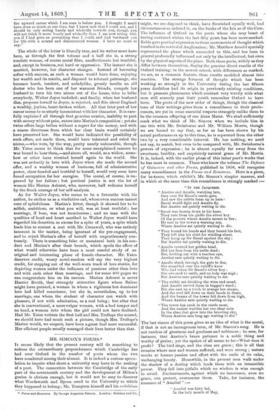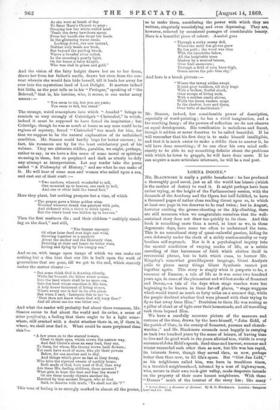MR. SIMCOX'S POEMS.* IT seems likely that the present century
will do something to redress the extraordinary preponderance which Cambridge has had over Oxford in the number of poets whom the two have numbered among their alumni. It is indeed a curious specu- lation to inquire what share a university may have in the making of a poet. The connection between the Cambridge of the early part of the seventeenth century and the development of Milton's genius is obvious enough, but it would not be easy to discover what Wordsworth and Byron owed to the University to which they happened to belong ; Mr. Tennyson himself and his sodalitium
• Poems and Romances. By George Augustus Bimeox. London: Btrahan and Co. might, we are disposed to think, have flourished equally well, had circumstances so ordered it, on the banks of the Isis as of the Cam. The influence of Oxford on the poets whom she may boast of having nurtured within the last fifty years has been more marked. Keble gave poetical expression to those movements of thought which resulted in the revival of Anglicanism; Mr. Matthew Arnold specially represented the phase which succeeded to this, and has been in general profoundly influenced not only by the intellectual, but even by the physical aspects of the place. Both these poets, widely as they differ between themselves, display the genuine direct results of the Oxford training; in the newest school, with differences as marked, we see, as a common feature, these results modified almost into reaction. The strange ferment of thought which has been working so strongly in the University during the last fifteen years doubtless had its origin in previously existing conditions, but it presents phenomena which contrast very vividly with what men still scarcely past their youth remember Oxford to have been. The poets of the new order of things, though the classical tone of their writings gives them a resemblance to their prede- cessors, are yet in some essential respects strangely unlike them to be the common offspring of one Alma Mater. We shall sufficiently mark what we think of Mr. Simcox when we include him in one trio with Mr. Swinburne and Mr. William Morris, though we are bound to say that, as far as has been shown by his actual performances up to this time, he is separated from the other two by a very considerable interval. He has nothing, we need not say, to match, but even to be compared with, Mr. Swinburne'a powers of 'expression ; he is almost equally far away from the sweetness, lucidity, and exquisitely natural grace of Mr. Morris. It is, indeed, with the earlier phase of this latter poet's works that he has most in common. Those who know the volume The Defence of Guinevere and other Poems, published in 1858, will recognize many resemblances in the Poems and Romances. Here is a piece, for instance, which exhibit's Mr. Simcox's simpler manner, and in which at the same time this resemblance is strongly marked :— " Is THE JACQUERIE.
"Anstice and Amalie, watching late, Sate over Sir Raoul's castle-gate, And saw the rabble foam up in hate : Raoul would fight and Amalie fly, But Anstice sat quietly waiting to die.
"Raoul was beaten down to his knee, They tore from his girdle the silver key Of the postern where Amalie meant to flee ;
He cast to the tower a warning cry,
Where Anstice sat quietly waiting to die.
"They bound his hands and they bound his feet, They loft him his shirt for winding-sheet, They hung up Sir Raoul against the sky ; But Anstice sat quietly waiting to die.
"Amalie covered her golden head, Hid her face from the noble dead ; But, looking out with a tearless eye, Anstice sate quietly waiting to die.
" Amalie slunk through the gate to flee, She stumbled over the caitiff's knee Who had taken Sir Raoul's silver key : She swooned to earth, and no help was nigh ; But Anstice sate quietly waiting to die.
" The rabble sat drinking the wine and mead, And Amalie served them in beggar's weed ; But she cast up a torch to avenge her shame, And the roof fell down on their heads in flame, And the beams of the tower fell down from high, Where Anstice sate quietly waiting to die.
"The tower has sunk in the castle moat, And the cushat warbles her one clear note In the elms that grow into the brooding sky, Where Anstice sate long ago waiting to die."
The last stanza of this poem gives us an idea of what is the moral, if that is not an incongruous term, of Mr. Simcox's song. He is not careless of greatness and goodness and nobleness ; he sees, for instance, that Anstice's brave patience is a noble thing and worthy of praise ; yet the upshot of all seems to be—What does it profit? The bird sings, and the elms are green ; this is all that remains where men and women suffered, and were strong ; nature mocks at human passion and effort with the smile of its calm, unchanging beauty. Meanwhile, in the present men walk under the shadow of a destiny which leads them with an irresistible power. They fall into pitfalls which no wisdom is wise enough to avoid. Enchantments, against which no innocence, even no grace, can protect, overmaster them. Take, for instance, the romance of " Amabel " :— " Amabel was fairy led,
In the holy month of ➢fay, As she went at break of day To Saint Mary's Church to pray ; Stooping low her white-veiled head 'Neath the dewy hawthorn spray, From her bands she dropt her beads In the glistening water reeds.
Looking down, she saw instead, Neither holy beads nor book, But beyond the purling brook, Where a broader river rolled, In the morning's pearly light, On his knees a fairy knight, Who was clad in green and gold."
And the vision of the fairy knight draws her on to her doom, draws her from her father's castle, draws her even from the con- vent wherein she would fain hide herself, till it leads her away for ever into the mysterious land of Lost Delight. It matters indeed but little, as the poet tells us in his " Prologue," speaking of " the Beloved," that is, his heroine, who, it seems, is one under many names :—
"You seem to sin, but you are pure; You seem to fall, but stand."
The strange, weird atmosphere into which " Amabel" brings us reminds us very strongly of Coleridge's " Christabel," in which, indeed it must be supposed to have found its inspiration ; but Coleridge, though he was as much at home as any man could be in regions of mystery, found " Christabel " too much for him, for that we suppose to be the natural explanation of its unfinished condition. Mr. Simcox could hardly hope for better success ; in fact, his romances are by far the least satisfactory part of his volume. They are elaborate riddles, parables, we ought, perhaps, rather to say, as we have a dim sense of some moral or spiritual meaning in them, but so perplexed and dark as utterly to defy any attempt at interpretation. Let any reader take the poem called "A Philosophy of History," and see what he can make of it. He will hear of some men and women who sailed upon a sea, and cast out of their craft :—
" Two anchors, whereof, wonderful to tell,
One mounted up to heaven, one sank to hell, And one or other held the vessel fast."
Here they plant, but nothing prospers but a vine, of which
"The grapes gave a bitter golden wine, Whereof whoever drank was parched with pain, And sickened with a thirst to drink again; But the vine's head was hidden up in heaven."
Then the first mariners die ; and their children " multiply stand- ing on the dead," and still,
"The human masonry Of other later dead rose high and wide, Growing together in a mystery About the anchor and the Heavenly vine, Drinking at their sad feasts its bitter wine, Living and dying by the hungry sea."
And so on, with image upon image of which we can make out nothing but a dim hint that our life is built upon the work of generations that are gone, till we get to the end, which scarcely makes the matter clearer :- " But some think God is drawing silently,
While far beneath the bitter water moans, Into the land where shall be no more sea, Into the land whose sunshine is His face, A holy house fashioned of living stones, Where every one is fair in its own place. But when I said, 'Interpret this to me '— ' Host thou not know where God will bury thee ?'
And all about me too was bitter sea."
And what the reader will probably feel about these romances, Mr. Simcox seems to feel about the world and its order, a sense of utter perplexity, a feeling that there ought to be a light some- where, still crushed with a doubt whether there is, or, if there is, where, we shall ever find it. What could be more perplexed than this 7—
"A few press on to the eternal towers, Clear to their eyes, which crown the narrow way, And find Christ's cross an easy load, they say, To them, for whom His thorny crown bath flowers ; Yet such have need of more, who ply their powers Below, for one another and to-day, And things which grow as feat as they decay, Who hive the ripened sweets of earthly hours. Both made of God, both used of God, then why Are these His darling children, these accurst ? What gain to hope the best and fear the worst ? Or are these moody rhymes another lie, Hatched by that ancient Dragon, who at first Said, to deceive with truth, 'Ye shall not die '? "
This tone of feeling is so strongly marked in almost all the poems, as to make them, considering the power with which they are written, singularly unsatisfying and even depressing. They are, however, relieved by occasional passages of considerable beauty. Here is a beautiful piece of colour. A tnabel goes
" Through a rocky mossy dell, Where the early fox-gloves grew By the path ; the wood was blue With the hyacinths below, All the hospitable trees Shaken by a scented breeze, Over frail anemones; Through a field of corn knee-high, Green across the pale blue sky."
And here is a brook picture :— " Where the tawny eddies swept Round grey boulders, till they leapt With a broken, fretful shock, Over scoops of living rock, With a sudden sunlit shiver, While the lesser runlets crept In the shadow, here and there, Over tufts of maidenhair."
Mr. Simcox, indeed, has considerable power of description, especially of word-painting ; he has a vivid imagination, and a far-reaching fancy ; of the powers of reflection we do not observe an equal development. His versification is melodious and fluent, though it seldom or never deserves to be called beautiful. If he will remember that his first duty is to make himself intelligible, and that it is much easier to make a riddle than to answer it, he will have done something ; if he can clear his own mind suffi- ciently to be able to say something definite about the problems with which he loves to grapple, he will have done more. If he can acquire a more articulate utterance, he will be a real poet.































 Previous page
Previous page